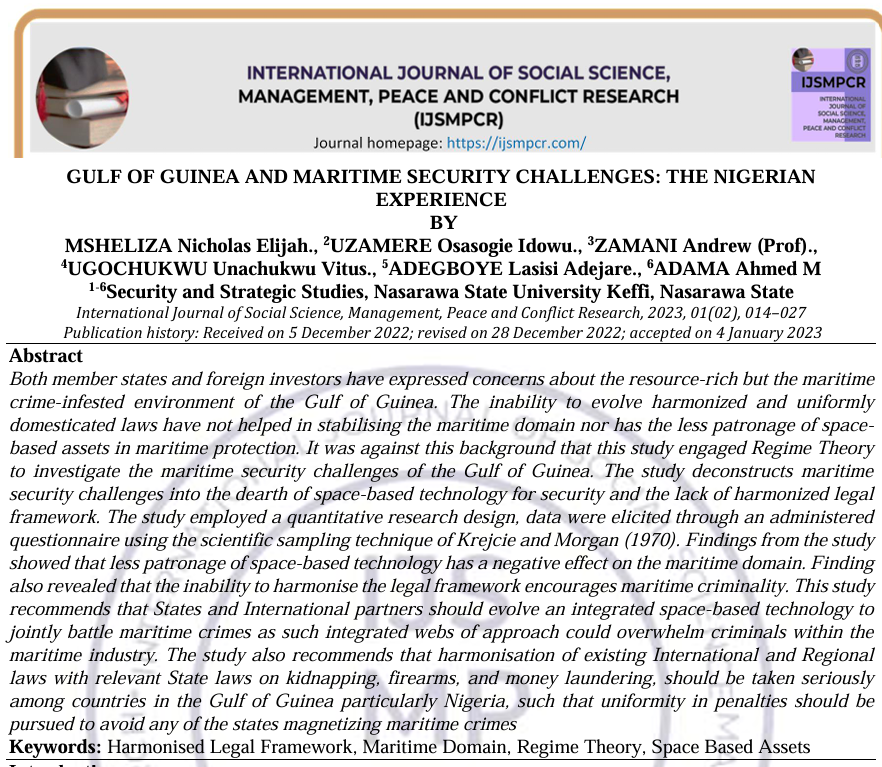Archives - Page 2
-
Adoption of compressed natural gas and national security in Nigeria
Vol. 10 No. 2 (2024) -
Porous borders and illicit arms deal: Implication for Nigeria national security
Vol. 10 No. 1 (2024) -
ECOWAS formation and Nigeria’s role in peace support operations
Vol. 1 No. 03 (2024) -
Electoral violence and democratic governance in Nigeria
Vol. 1 No. 01 (2024) -
In search of what is security and whose responsibility should be security in Nigeria
Vol. 2 No. 01 (2023) -
Military instrument for conflict resolution: A study of AU peace keeping missions
Vol. 2 No. 01 (2023) -
INSECURITY AND THE POLITICAL ECONOMY OF BORNO STATE, NIGERIA
Vol. 1 No. 08 (2023) -

Armed banditry’s nature and character on human security in Niger state, Nigeria
Vol. 1 No. 08 (2023) -
IMPACT OF INCESSANT VIOLENCE AND BIMODAL VOTER ACCREDITATION SYSTEM ON NIGERIA ELECTORAL BODY’S PREPAREDNESS FOR 2023 GENERAL ELECTION
Vol. 1 No. 01 (2023)The common denominator in acts and in deeds by the Independent People of Biafra, Yoruba Nation Agitators, the Islamic State of West African Province, and Boko Haram cell groups is the outright dissociation from the conduct of the 2023 General Election. Activities of these non-state armed actors have since snowballed into a supply meet demands of disgruntled politicians, as seen from the apparent incessant attacks on Assets and Supplies of the Independent National Electoral Commission, which further threatens the already garnered electoral public confidence, via the deployment of the Bimodal Voter Accreditation System. It was against this background that this study engaged the theory of Structural functionalism to interrogate the incessant electoral pattern violence and bimodal voter accreditation system on Nigeria's electoral body’s preparedness for the 2023 General Election. The study is a thematic study conducted by examining the literature on electoral violence and electoral technology, obtained through searches in publicly available materials. Literature from non-serial publications, official reports, and conferences, particularly, if they have been cited by other references in term of e-voting, and regional agitations against democratic institutions. The study revealed that the deployment of the Bimodal Voter Accreditation System positively influences electoral body preparedness for the 2023 General Election while incessant violence against the electoral body’s assets and supply negatively impacts on the preparedness of the electoral body’s preparedness. The study recommends that all relatedly involved institutions and all tiers of government, should be supportive of the deployment of electronic voting as it is the flagship for the credibility of the 2023 General Election preparedness while the Federal government should extend electoral participation to licensed private Guards companies and other profiled quasi-paramilitary bodies since government Security Agencies are presently overwhelmed by the plethora of internal insecurity.
-
Gulf of Guinea and maritime security challenges: The Nigerian experience
Vol. 1 No. 01 (2023) Both member states and foreign investors have expressed concerns about the resource-rich but the maritime crime-infested environment of the Gulf of Guinea. The inability to evolve harmonized and uniformly domesticated laws have not helped in stabilising the maritime domain nor has the less patronage of space-based assets in maritime protection. It was against this background that this study engaged Regime Theory to investigate the maritime security challenges of the Gulf of Guinea. The study deconstructs maritime security challenges into the dearth of space-based technology for security and the lack of harmonized legal framework. The study employed a quantitative research design, data were elicited through an administered questionnaire using the scientific sampling technique of Krejcie and Morgan (1970). Findings from the study showed that less patronage of space-based technology has a negative effect on the maritime domain. Finding also revealed that the inability to harmonise the legal framework encourages maritime criminality. This study recommends that States and International partners should evolve an integrated space-based technology to jointly battle maritime crimes as such integrated webs of approach could overwhelm criminals within the maritime industry. The study also recommends that harmonisation of existing International and Regional laws with relevant State laws on kidnapping, firearms, and money laundering, should be taken seriously among countries in the Gulf of Guinea particularly Nigeria, such that uniformity in penalties should be pursued to avoid any of the states magnetizing maritime crimes.
Both member states and foreign investors have expressed concerns about the resource-rich but the maritime crime-infested environment of the Gulf of Guinea. The inability to evolve harmonized and uniformly domesticated laws have not helped in stabilising the maritime domain nor has the less patronage of space-based assets in maritime protection. It was against this background that this study engaged Regime Theory to investigate the maritime security challenges of the Gulf of Guinea. The study deconstructs maritime security challenges into the dearth of space-based technology for security and the lack of harmonized legal framework. The study employed a quantitative research design, data were elicited through an administered questionnaire using the scientific sampling technique of Krejcie and Morgan (1970). Findings from the study showed that less patronage of space-based technology has a negative effect on the maritime domain. Finding also revealed that the inability to harmonise the legal framework encourages maritime criminality. This study recommends that States and International partners should evolve an integrated space-based technology to jointly battle maritime crimes as such integrated webs of approach could overwhelm criminals within the maritime industry. The study also recommends that harmonisation of existing International and Regional laws with relevant State laws on kidnapping, firearms, and money laundering, should be taken seriously among countries in the Gulf of Guinea particularly Nigeria, such that uniformity in penalties should be pursued to avoid any of the states magnetizing maritime crimes.





